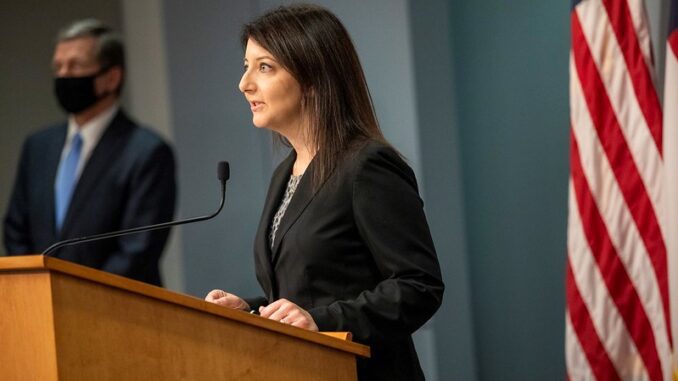
RALEIGH — A state audit of the Medicaid provider enrollment process overseen by the N.C. Department of Health and Human Services (NCDHHS) revealed millions in overpayments, including ineligible and possibly dangerous providers.
The N.C. Medicaid’s Division of Health Benefits webpage states, “We are proud of our commitment to be good stewards of taxpayer money while continuing to provide valuable health programs and services to the Medicaid population,” however, the current audit and a previous audit in 2019 have both found millions in improper payments and lingering oversight issues.
The audit, published by the office of N.C. State Auditor Beth Wood on Feb. 8, sampled only a small fraction of the 90,000 Medicaid providers in the state and says the department “did not perform background checks, verify credentials, and complete other steps necessary to determine whether the undisclosed owners were eligible to be enrolled in Medicaid.”
As noted by the audit, NCDHHS employed a contractor for reverification processes. The contractor, General Dynamics Information Technology, failed to validate and verify provider license credentials and ownership details. Of the 191 approved applications the audit sampled, 185 never had their credentials verified and none of the 191 had their ownership verified. The audit says $11.4 million was paid out to uncredentialed providers.
An example includes the president of an assisted living facility who is a defendant in a lawsuit alleging $60 million in Medicaid fraud. The suit alleges he did not disclose his controlling interest in an assisted living facility which was paid an estimated $1.8 million by Medicaid.
In response to the ownership check failures, the agency claimed they aren’t required to check for that information despite the fact the Centers for Medicaid and Medicare Services’ best practices include ownership checks and verifications with licensing boards. In her response, NCDHHS Secretary Mandy Cohen agreed that such checks were a “best practice” and would look for ways to improve procedures and policies.
A key finding was NCDHHS’ failure in identifying and removing providers with terminated, suspended or limited professional licenses.
The audit looked at 66 Medicaid providers disciplined by their licensing board, of which “26 had a suspended or terminated license during SFY 2019.” Those 26 were tested to see if NCDHHS had removed them from the program. Investigators found that “18 providers (69%) with suspended or terminated licenses were not removed from the Medicaid program at all” and NCDHHS only removed 14 after auditors brought it to the department’s attention.
The section on licensing issues also says that “21 unlicensed providers received approximately $1.64 million in Medicaid payments from the date of their license suspension or termination through June 30, 2020.”
The failure to remove providers with license issues put an estimated 2,400 Medicaid beneficiaries in danger, as many of the suspensions and terminations involved criminal activity. At least five examples were given, which included one provider whose patient died after oral surgery and a limitation placed on a provider’s license prohibiting the treatment of female patients. That provider had a previous license limitation that required that a chaperone be present “because of multiple past sexual and professional misconduct allegations.”
Some of the issues with weeding out ineligible providers were due to NCDHHS failing to monitor the disciplinary reports from the professional state licensing boards “as required by its own policy.” Apparently, the email system (NCTRACKS) set up in 2015 to receive reports from those boards had not received any emails and no one at NCDHHS remedied the situation.
According to the audit, “Instead of investigating the lack of emails, the individual at the Division responsible for receiving these emails reported to Division management that there were no disciplinary actions from the state licensing boards for every month since 2015. Division management accepted this response without further investigation.”
Cohen’s response letter to the auditor largely agreed with the findings. Cohen mentions a repayment amount of $13.4 million, which is tied to provider verification processes in the audit.
“The $13.4M is what has actually been identified as Medicaid moneys paid to provider(s) that have been determined ‘not’ to be eligible and should not have been paid,” Wood told North State Journal in an email. She also noted that figure refers to the sample of 191 providers pulled from the 27,334 total providers whose credentials NCDHHS said had been reverified in 2019.
In the audit, Wood wrote that the repayment figure “does not include all overpayments that may exist in the entire population of payments made to Medicaid providers.”
When asked to give an extrapolation of the costs beyond the sample size of the audit, Wood said that she couldn’t give a dollar total because there is no way to determine what services and related dollar amounts would have been paid to various providers.
Program administration questioned
“Medicaid is a very large government-run program and it’s not realistic to expect there to never be problems,” Senate Health Care Committee co-chair Sen. Joyce Krawiec (R-Forsyth) said in a statement. “But the oversight failures identified by the auditor seem so basic and so problematic that it raises serious questions about NCDHHS’s ability to administer the program. Worse, the very people responsible for these failures advocate for adding 500,000 people to its rolls.”
Krawiec’s concerns are underscored by failures found in a previous audit. In 2019, an audit by Wood’s office found the department made improper payments of $100 million in Medicaid claims. It also found improper documentation and ineligibility issues resulting in an “estimated $71.7 million net overpayment to Medicaid providers.”
Such failures found in audits of the Medicaid program may hamper persistent Medicaid expansion efforts by Gov. Roy Cooper.
Just three days after taking office in 2017, Cooper suggested he would use his executive authority to expand Medicaid under Obamacare, despite a 2013 state law, as well as state constitutional conflicts, that would prohibit such an action. Cooper moved forward with the idea, but Republicans successfully petitioned the courts to stop Cooper’s attempt to expand Medicaid.
Cohen, who was the senior advisor to the administrator of CMS under the Obama Administration, was picked by Cooper to be secretary of NCDHHS around the same time the court fight occurred.
The Affordable Care Act (ACA), known more widely as Obamacare, expanded Medicaid to cover childless adults whose income is at or below 138 percent of the federal poverty level. As of mid-2020, 38 states and Washington, D.C., had expanded or voted to expand Medicaid. Estimates of Medicaid expansion put the cost to taxpayers at around $6 billion over a ten-year period from 2020 and 2030.
Medicaid Fraud in North Carolina
According to NCDHH’s most recent Medicaid financial report, the state’s program serves over 2.2 million residents and boasts that the Medicaid budget “finished state fiscal year 2020 with cash-on-hand for the seventh consecutive year.” The department processed 227 million claims and spent $16.9 billion in federal and state funds for the fiscal year 2020. In 2019, combined state and federal Medicaid totaled $14.6 billion.
According to the same financial report, the NC Medicaid Office of Compliance and Program Integrity tried to curb fraud by conducting “prepayment reviews that resulted in denied or reduced claims representing $33,389,125 in reduced costs to the state.”
While the audit by Wood’s office does say the risk of fraud is increased by failing to remove certain providers, it did not directly address Medicaid fraud in the state. The audit does note a Government Accountability Office (GAO) report showing “States’ non-compliance with provider screening and enrollment requirements contributed to over a third of the $36.3 billion estimated improper payments in Medicaid in 2018.”
The dollar figure for Medicaid fraud in North Carolina changes each year, however, according to a late Dec. 2020 press release by the N.C. Department of Justice, its Medicaid Investigations Division (MID) has recovered over “$900 million in restitution and penalties” for the state.



